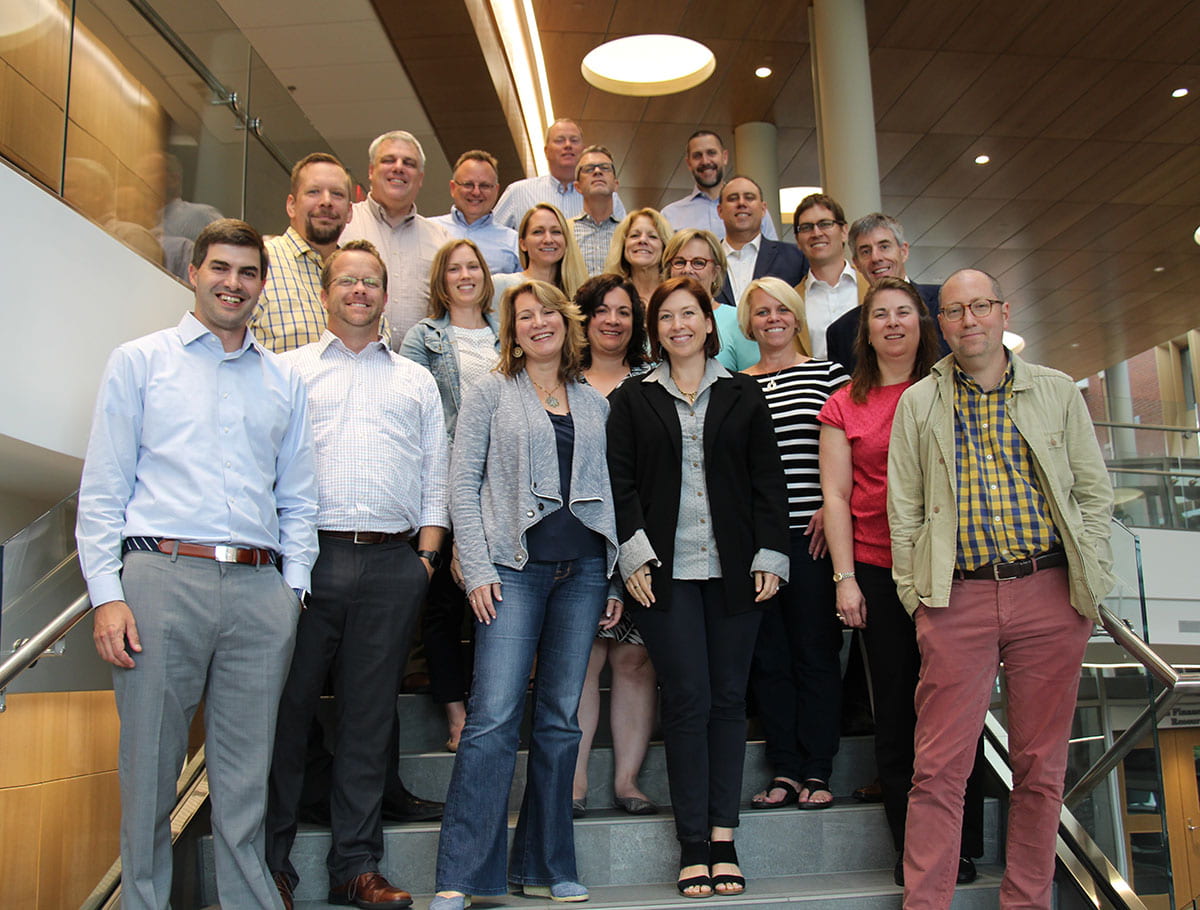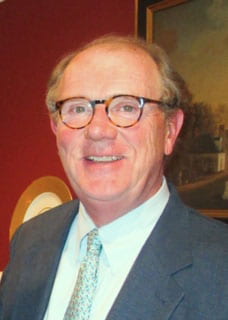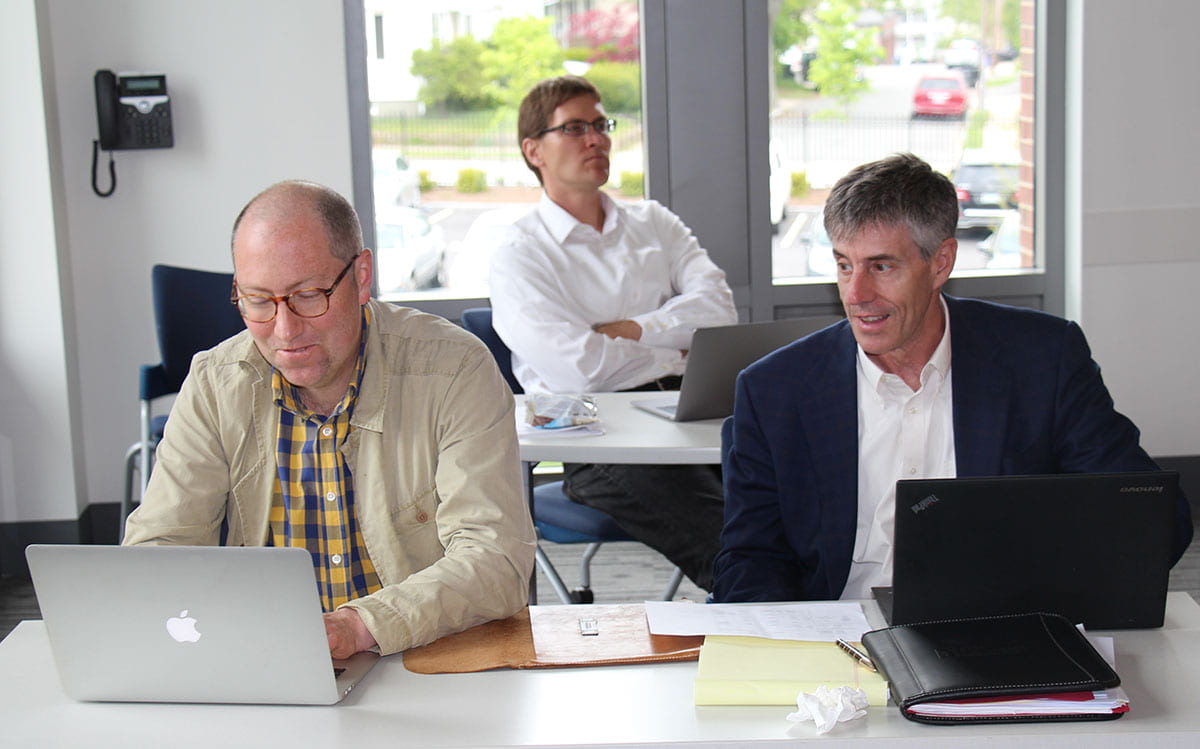Global firm partners with PC to improve executives’ critical thinking

By Charles C. Joyce
When Washington, D.C.-based public policy and government affairs executive Bernard F. McKay ’74 wanted to sharpen the critical-thinking skills of his senior corporate affairs leaders at Intuit Inc., he looked to Providence College and its School of Business.
“There are many things I’ve carried with me from my years at PC, but none has been more significant in its impact than critical-thinking skills…. It was PC’s greatest life gift,” said McKay, Intuit’s chief public policy officer and senior vice president for global corporate affairs.
Known for flagship products like TurboTax, QuickBooks, and Mint, Intuit develops and sells financial, accounting, and tax preparation software and related services to help small businesses, accountants, and individuals prosper.
McKay, who joined Intuit in 1998, is the catalyst in a new partnership between the corporate software giant and PC, one in which the College has provided significant training opportunities for Intuit employees. It is the second national partnership underscored by professional development that the PCSB has established. The business school also provides management education training to employees of CVS, the country’s largest pharmacy chain, which is headquartered in Rhode Island.

PC welcomed 18 employees from Intuit’s corporate affairs department to two days of critical-thinking workshops in the Arthur F. and Patricia Ryan Center for Business Studies. The group was composed of senior leaders, directors, and vice presidents from across the country. The training was different from CVS’s not only in strategic content but also in that it involved faculty from the School of Arts & Sciences.
Dr. Dan Horne, professor of marketing and associate dean of the PCSB, who noted that employers see critical thinking as one of the top skills necessary for high-achieving employees, said the workshops were built around core skills that can be taught and practiced. These mirror foundational elements of a PC liberal arts education, said Horne.
“It’s an interdisciplinary effort firmly based on our strengths as an institution,” said Horne, who coordinated the workshops. The ability to integrate critical-thinking lessons from across disciplines is unusual at larger schools where departmental silos tend to reduce collaboration, he added. “However, it’s an important part of what we are doing here at PC.”
Based on his career experience, McKay, who interacts regularly with policymakers including members of Congress and lobbyists, knew that training in critical thinking would greatly benefit Intuit employees.
“Critical-thinking skills and methodology have touched every part of my life and added the single-greatest value to my professional career environment, in both the public and private sectors. It in many ways provided a differential and competitive edge, a key to success,” said McKay.
Before joining Intuit, McKay was a vice president at AT&T, where he worked in government relations positions, and he served as deputy director of Hewlett-Packard’s Washington government affairs office. Prior to those positions, he worked in the public sector with the U.S. Department of Energy, the Environmental Protection Agency, and the R.I. Department of Health. In addition, he has served in numerous staff and management positions in presidential, senatorial, and gubernatorial election campaigns.

It wasn’t until several years after he had graduated from PC with a degree in political science that McKay realized the influence of learning critical-thinking skills and how applicable they were to his professional life.
“It was woven into the curriculum, essentially teaching a person how to think,” he said. “As a practical matter, this involves instinctively applying logic, philosophy, and ethics to problem solving, strategic analysis, and decision making.” In simpler terms, critical thinking is the ability to “think differently.”
“As much as you learn about Western civilization, history and government, classical literature, the arts, and more in a PC education — all of which was important to me — it has always seemed to me that logic, philosophy, and ethics created particularly enduring value, not because of the individual courses, but the fact that they were present in everything else that was taught … sort of like ‘The Force,’” said McKay.
In 2017, when McKay approached Dr. Sheila Adamus Liotta and Dr. Sylvia Maxfield, deans of the schools of arts & sciences and business, respectively, about the possibility of training for his staff and colleagues, he did so not only out of a compulsion to “paying it forward” but for other reasons. He knew it would be a professional development experience that would benefit participants individually and impact Intuit’s success as a business enterprise.
Horne and Whitney MacDougall, senior leader for special projects at Intuit, were charged with developing a professional development opportunity. MacDougall, who discussed content ideas with McKay, and Horne determined Intuit employees would benefit from training that would help them in thoughtful, strategic decision making and in their ability to be effective in clearly communicating when working with legislators and policymakers at the state and national levels. Moreover, the idea was to build a culture of critical thinking upon the foundation McKay had laid that would infuse and energize the corporate affairs team.
Horne explained, “I thought Intuit’s needs really matched our capabilities. Certainly, the classical foundation had to be there, but it also had to be made relevant to the participants’ actual work. Fortunately, I had previously worked with some people in the humanities who could both provide a very strong conceptual background and make it directly applicable to the working lives of these business professionals.”
Horne recruited Dr. Raymond Hain and Dr. Colin G. King, associate professors of philosophy, and Dr. Sharon Ann Murphy, professor of history, to join the team to develop and execute the program. The resulting program is dubbed “ACT” for actionable critical thinking.
In planning for the ACT workshops with Intuit, the PC team integrated works as disparate as Aristotle’s Poetics and Rhetoric, recent research in cognitive science, and the essays of Milton Friedman. The objective however, was to use these important works to emphasize the practicality of the lessons contained within — discernment, logical analysis, systematic decision making, and effective communication. A variety of teaching techniques, including deep reading and critical analysis, focused discussions, live cases, and debates, would allow the participating faculty to engage the participants in a manner that reflected their personal strengths.
Horne and King kicked off the program by traveling to Washington, D.C., to lead a half-day workshop with Intuit senior leaders. The focus was on argumentation, persuasion, and overcoming personal barriers to good decision making. This was followed by interactive online sessions with the PC team on campus and the Intuit team spread out across North America.
Not long thereafter, the PC team hosted the entire Intuit group at the Ryan Center. The two days on campus allowed for reinforcement of earlier lessons and for sustained engagement with new materials. It culminated in an animated and hotly contested series of team debates.

The training in critical thinking was extremely useful to the managers and staff members who work in the public policy environment, said MacDougall. It is an approach Intuit strives to cultivate, as it is “an essential component to developing and executing thoughtful strategies that create win-win outcomes.”
MacDougall pointed out that the workshop curriculum focused on important skills such as argumentation, persuasion, logical syllogism, values and ethics, and deliberation. The case studies and a spirited debate allowed the group to immediately apply those skills and concepts to reinforce the learning.
“All of this is relevant to the work we do,” said MacDougall, noting that PC and Intuit are developing additional continuing education opportunities for the company. Importantly, the ACT program had an immediate, positive impact on the corporate affairs team, supported by their feedback throughout the program.
Horne said the value of the management education and training workshops and the new partnerships can’t be overstated. Working effectively with national companies by leveraging the College’s core strength in the liberal arts puts PC in front of an audience that might have a limited awareness of the school, he said.
Maxfield noted, “There is a tremendous opportunity for programs like ACT to showcase the quality of PC’s deep and unique integration of business and the liberal arts. Externally, it is a strong reputational signal to be working with great companies. Internally, such interdisciplinary work breaks down traditional barriers and helps us understand how much we can learn from each other.”
Maxfield and Horne not only would like to continue to expand the relationship with Intuit but also aim to develop partnerships with other corporate and government entities — bolstering the College’s profile as a leader in providing professional development skills with a strong liberal arts twist.
“ACT provides a fantastic blueprint for helping differentiate PC,” said Horne.





